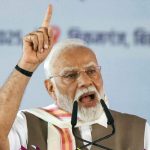Former Jammu and Kashmir Chief Minister Ghulam Nabi Azad on Monday expressed disappointment over the Supreme Court verdict upholding the abrogation of Article 370 and said people of the region were “not happy”. He, however, welcomed the limit set by the apex court for holding assembly polls.
Azad, who is chief of the Democratic Progressive Azad Party (DPAP), said that the unemployment scenario in Jammu and Kashmir can worsen on account of the removal of 35A as people from other parts of the country can apply for jobs.
“We are disappointed over the Supreme Court verdict,” Azad told reporters.
The former union minister said he has been stating that only the central government or the Supreme Court can decide on the matter.
The central government, he said, took the decision to abrogate Article 370 (the attendant Article 35A was annulled) and it would not have changed its stance.
“This was our last hope…It is a unanimous decision. I think people of Jammu and Kashmir, whether in Kashmir or Jammu, are not happy,” he said.
Azad said that the people of Jammu and Kashmir had a “sentimental” link with Article 370 and 35A and it was “historical” for the region.
He said article 35A was incorporated in the “constitution of Jammu and Kashmir” in line with the decisions taken by Maharaja Hari Singh, the erstwhile ruler, so that outsiders cannot purchase land in the state or get employment.
He said the removal of Article 35A will “cause great harm to Jammu and Kashmir’s economy, lands will get costlier,” and people from all over the country can apply for jobs, making it difficult for the locals to get them.
He said Jammu and Kashmir does not have a big industry and a lot of people depend on tourism for their livelihood. “Unemployment will rise,” he said.
Azad said that Jammu and Kashmir has borders with Pakistan and China and 35A was incorporated considering special circumstances.
He said the decision to abrogate Article 370 in August was a “mistake” and was taken in a “hurry”. He said political parties in Jammu and Kashmir were not consulted.
The former union minister said the apex court has “at least” fixed the date for assembly polls and restoration of statehood would follow.
“This is in our favour,” he said. Azad floated DPAP after parting ways with Congress.
The Supreme Court on Monday upheld the Union Government’s decision to abrogate Article 370 of the constitution which gave special status to Jammu and Kashmir and said that every decision taken by the Centre on behalf of a State can’t be subject to a legal challenge.
A five-judge Constitution bench comprising Chief Justice of India DY Chandrachud, Justices Sanjay Kishan Kaul, Sanjiv Khanna, BR Gavai, and Surya Kant delivered the verdict.
The Constitution Bench was hearing a batch of petitions challenging the abrogation of Article 370 of the Constitution and bifurcating the state into two Union Territories.
CJI Chandrachud, reading out the judgement, said that every decision taken by the Centre on behalf of a State under proclamation can’t be subject to a legal challenge and it will lead to the administration of the State to a standstill.
Supreme Court said that it has held that Article 370 was a temporary provision.
“The proclamation of Maharaja stated that the Constitution of India will supersede. With this, the para of Instrument of Accession ceases to exist….Article 370 was an interim arrangement due to war conditions in the State. Textual reading also indicates that Article 370 is a temporary provision,” the Court said.
The apex court also mentioned that the argument of the petitioners that the Union government cannot take actions of irreversible consequences in the State during Presidential rule is not acceptable. (ANI)








